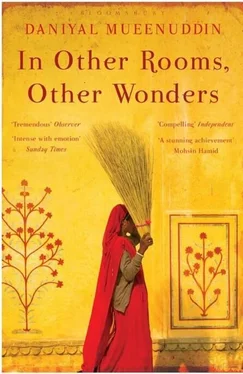‘Ah, well.’ I paused, thinking. ‘That’s an old story. The exploding stove. What can I do about it?’
‘Sir, Khadim served you since before he began shaving. The police are under pressure to beat him.’
‘I suppose he’ll confess.’
No reply.
I told the brother to take the next bus for Lahore and rang off.
When I woke next morning, no eggs. The cook had not got them. He told me that Khadim always bought the eggs. I sat eating toast with marmalade, poured a second cup of tea, and then picked up the Pakistan Times and took its crisp virginity, inhaling the scent of damp ink and newsprint. I enjoy this paper because it gives me absolutely no information except that which is sponsored by the government. It never disrupts my morning.
Shaved and showered, glistening, as I like to think of myself, I paid my respects to my wife, who lies in bed each morning, sipping tea and planning operations for the day ahead, and then proceeded out into the verandah where the car stood in the cool gloom. The key to my mornings is order. Thus, I went out precisely five minutes earlier than usual, in order to speak with Khadim’s brother, who as I expected stood waiting for me.
This man is of a type I often encounter in my courtroom, distinguished by a glossy mustache, excessively clean and pressed clothes, and a battered and invariably maroon-colored portfolio held in one hand, from which he produces volumes of papers to bolster his arguments, papers that only further confuse the matter. One of my small indulgences, now that I am a member of the judiciary, is to allow myself airs with people who need favors from me. I gave him my hand with a loose wrist, as if expecting him to kiss it, and stood on one cocked heel.
He began to make the usual obeisance, asking after Madam, the children, my health.
I cut him off. ‘Yes, yes. So tell me what happened. I only have a few minutes.’ (An enormity! I intended to spend the morning, as I often do, drinking tea and being really thorough about reading the rest of the newspaper. My personal secretary does most of my work.)
‘There was a robbery in my family’s house, Your Honor.’
‘And what did you lose?’
‘All my father’s money.’
This could hardly come to much. The boy’s father cooks for some landlord family, a type I know well — all punctilio and no pence. The servants in those households have the rapacity of vultures. Still, how much could he have pocketed?
‘Amounting to …?’
‘Three hundred thousand rupees and four sets of gold jewelry.’
My God, I thought. The old man should have been a policeman, not a cook. That’s a good sum to pack away, even if the master is a fool.
‘But of course. The fruits of long and faithful service, no doubt?’
The man said nothing but only looked at his feet.
After letting him stew for a long moment, I asked, ‘And what happened?’
‘Sir, my father worked for the same people for fifty years. He put away money, and with some of it he bought gold, and he kept all of it in a tin trunk in the house he built in our village, hidden among seven trunks full of clothes.’
‘Where all of you left behind kept a close eye on it. But not close enough.’
‘Yes, sir. As you know, sir.’ He held his hands crossed in front of him, one holding the maroon portfolio. I decided to let him tell the story, and to spare him the peppering of questions that I often use when reducing idiots like this to absurdities.
‘Well, sir, one morning we woke up, that would be Tuesday, two days ago, and someone had broken into the trunks, which we kept in a little kitchen, and had taken the money and the jewels. The police came and asked some questions — we phoned them as soon as we found out the loot was gone. At the end they talked to my wife, the deceased, but they hadn’t finished before dark. There’s no good road to our village, way up in the mountains, and they left, saying they’d be back the next day.
‘That night as usual we went to sleep on the terrace in front of the house. In the middle of the night I woke and there was my wife sitting on the ground next to me. Beside her the empty bottle of kerosene, and in her hand the match that set her on fire. A painful sight, Your Honor, just burning like fireworks. She had committed suicide. I ran to get help from the neighbors. In front of the house there’s a steep slope, and she fell down this, flames right up into the trees, and then she finally fell down on the ground, on her side, kind of spinning around with her legs, like a clock’s hands. When I returned she wasn’t even human, covered with sticky fluid, but she was still alive. We carried her to the road and then took a loader truck to the hospital in Abbotabad. She just would not die. A few hours later her father and brother came, and brought some policeman. The policeman registered a false statement from her, saying that Khadim set her on fire, and now he’s sitting in jail. Her family paid the police to beat him, but we also paid, so they’ve done nothing so far but kick him around a bit.’
‘Hmm,’ I said, putting my joined hands to my lips to indicate deep thought. ‘So, how many rooms in your house?’
‘Two, and then the terrace where we sleep in the summer.’
‘Were the trunks locked?’
‘Yes, sir.’
‘And how many people were sleeping on the terrace on the night the trunks were rifled?’
‘All of us. Me, my wife, my brother — he’d just arrived that night on leave from Your Honor’s house — and his wife, and five children.’
‘And of course the same people were there the night of the suicide.’
‘Yes sir.’
‘What really happened?’
He offered a little sigh before plunging in, as if regretting the folly of the world.
‘My wife and her brother, who lives in the next village, stole the money. I wouldn’t have thought it of her, sir. She is, or was, very weak, weak in the head. The police scared her, and she got afraid of what they’d do to her. Plain fear and shame is what it was. Everyone knows what happens to women in prison.’
‘And what are you suggesting I do?’
‘Sir, you are a judge, if you say a word to your fellow judge in Abbotabad, he will see the true merits of the case. Khadim has eaten your salt.’
‘And who will pay for all this? The judge, no matter how well disposed to me, will need to be oiled if he is to work. And then you’ll need a lawyer, court fees, tips to the judge’s readers, and most of all, something really magnificent for the police.’
‘My father works for Mr. K. K. Harouni’s nephew, up in Islamabad. You must know them, sir. His wife is American, and she already promised to help in whatever way she can.’
‘Oh yes, I know of the Harounis. Excellent. Your father works for the proverbial foolish son of a rich father. Enough. For me, as you know, this is a family matter. Tell your father to come see me. And go back to your home. Call me the day after tomorrow, at ten in the morning, exactly.’
Turning, I walked to the car. He trotted after me, no longer so composed, and as I opened the door he fell to the ground and put his hands on my feet.
I raised him up. ‘I’m going to ask you two questions, but I don’t want you to answer them. First, in a house of two rooms how could someone break into seven trunks without being heard? Merely knock on a trunk made of tin, much less break its lock, and it resounds like thunder. Second, why didn’t you try to put out the flames? Your wife must have burned for a long time, and she must have been screaming bloody murder throughout, so that you can’t possibly have slept through it. Her first screams should have woken you, before she so badly injured herself. Why go for the neighbors instead of helping her? Think about it.’
Читать дальше












